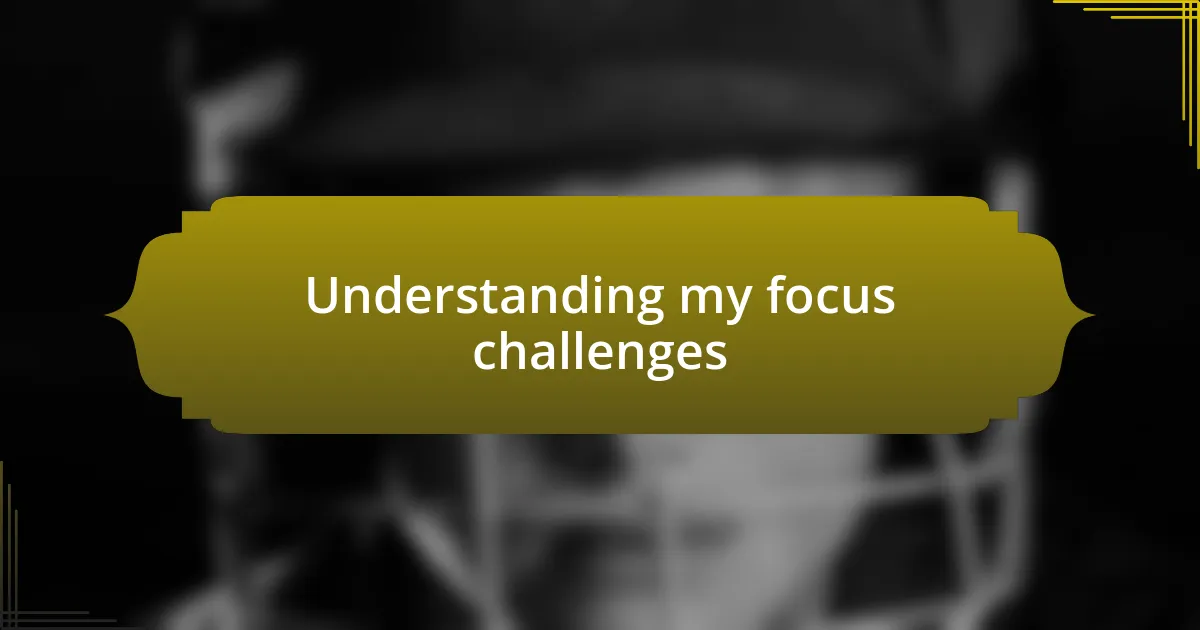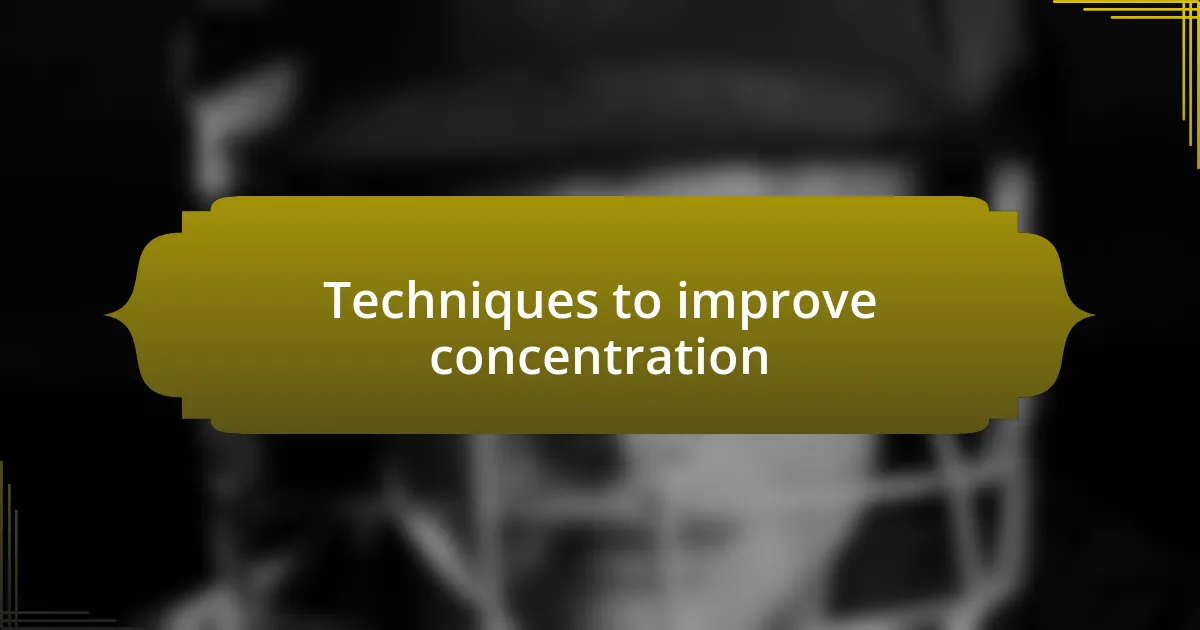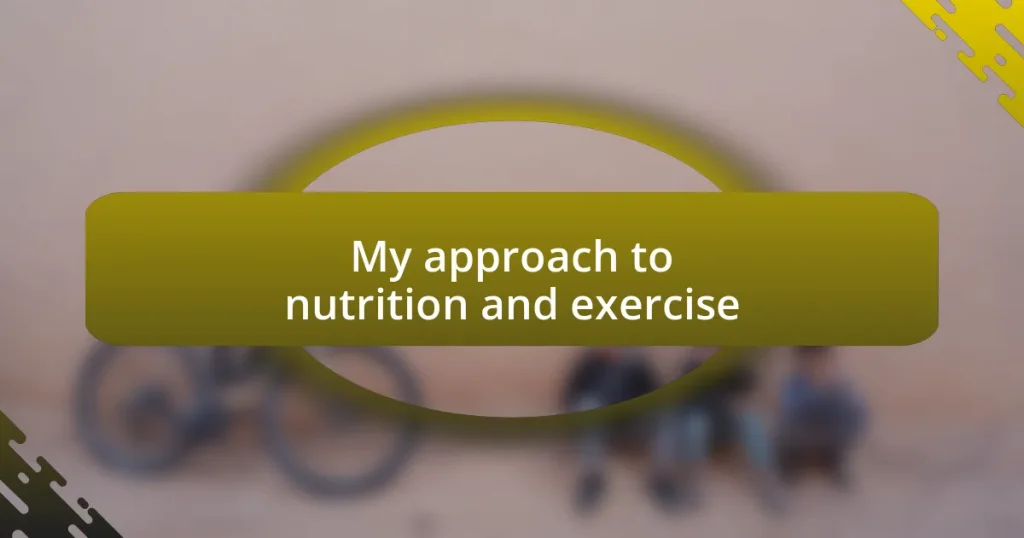Key takeaways:
- Understanding distractions in the environment, such as clutter and noise, is essential for maintaining focus.
- Setting achievable daily goals helps alleviate anxiety and enhances productivity by breaking tasks into manageable pieces.
- Incorporating time management techniques, like the Pomodoro Technique, and regular progress reviews can significantly improve concentration.
- Mindfulness practices, including mindful breathing and meditation, foster mental clarity and resilience against distractions.

Understanding my focus challenges
Understanding my focus challenges often feels like navigating a labyrinth with no clear exit. I remember sitting at my desk, determined to finish a project, yet I found myself distracted by every tiny sound around me—the hum of the refrigerator, the rustle of leaves outside. Would it actually be possible to tune out all those distractions and dive deep into my work?
There are days when my mind seems to race faster than I can think. While I’m trying to concentrate, my thoughts start branching out like vines—each new idea pulling my attention in a different direction. This constant pull can lead to frustration, leaving me wondering if I’ll ever match my intention with my attention. Have you ever felt like the harder you try to focus, the more elusive it becomes?
Then, there are moments of clarity that catch me off guard. I once had an afternoon where I was immersed in a task for hours, completely losing track of time. It felt exhilarating! But afterward, the shift back to reality was jarring. Why is it that I can sometimes achieve such focus and other times struggle immensely? Understanding these fluctuations in my ability to concentrate is a journey in itself.

Identifying distractions in my environment
Identifying distractions in my environment can be quite revealing. For instance, I’ve noticed that the clutter on my desk often distracts me more than I realize. A simple coffee cup or a stack of unopened mail can pull my gaze and thoughts away from the task at hand. Have you ever experienced that? It’s amazing how our surroundings can subtly shift our focus without us even being aware of it.
Sometimes, the distractions are more external. I recall a day when I was trying to write, and a neighbor started blasting music. At first, I thought I could tune it out. However, before long, I found myself tapping along instead of focusing on my work. It’s fascinating how our environments—whether it’s noise, visual clutter, or even people—can create barriers to our concentration.
I often think about how lighting plays a role too. About a month ago, I adjusted the lighting in my home office, and it made a significant difference in my ability to concentrate. Dim, yellow light can make me feel sluggish, while bright, white light can spark energy and focus. This change not only shaped my productivity but also shifted my mood. Identifying such factors has been crucial in managing my distractions effectively.
| Type of Distraction | Effect on Focus |
|---|---|
| Cluttered Workspace | Increases mental distractions |
| Loud Noises | Breaks concentration and rhythm |
| Poor Lighting | Affects energy levels and motivation |

Techniques to improve concentration
When it comes to enhancing concentration, I’ve found that the techniques I employ can vary significantly based on my mood and task. For instance, setting specific time blocks to work on assignments has transformed my approach. I usually use a timer for 25-minute bursts, followed by a 5-minute break. This method keeps my mind sharp and makes daunting tasks feel more manageable.
Here are some techniques that have worked for me:
- Pomodoro Technique: Work for 25 minutes, then take a 5-minute break to recharge.
- Mindfulness Meditation: A few minutes of focused breathing can help center my thoughts and clear mental clutter.
- Task Prioritization: Listing tasks by importance reduces overwhelm and directs my focus to what truly matters.
- Background Music or Sounds: I sometimes play instrumental music or white noise, which can create a rhythm that helps me concentrate.
- Physical Activity: Even a short walk or stretch can invigorate my focus, making it easier to return to work with fresh energy.
I’ve noticed that incorporating these techniques into my daily routine not only helps me stay on task but also reduces the sense of frustration when distractions arise. There’s an undeniable sense of accomplishment when I can complete tasks efficiently, and these strategies play a crucial role in that success.

Setting achievable goals daily
Setting achievable goals on a daily basis has become a game changer for me. I often look at my to-do list and feel that familiar anxiety creeping in, but I’ve discovered that breaking my tasks into smaller, manageable goals helps alleviate that pressure. For example, instead of saying, “I need to finish my project,” I might say, “Today, I’ll outline the first section.” This shift not only clarifies my focus but also provides a sense of accomplishment when I check that box off at the end of the day.
I remember a time when I overloaded myself, aiming to complete an entire week’s worth of tasks in a single sitting. The result? Overwhelm and frustration. Now, I find that setting one or two main goals allows me to concentrate my efforts and actually enjoy the process. It’s like the difference between sprinting and pacing myself during a long run; both have their merits, but pacing helps me reach the finish line without burning out.
One strategy that I’ve embraced is reflecting on my completed goals at the end of the day. This simple practice gives me a boost of motivation and reinforces the importance of achievable objectives. Have you ever taken a moment to appreciate your progress? I believe celebrating small wins is crucial to maintaining focus and can foster a more positive mindset. It’s these incremental steps that build towards larger achievements, making the entire journey feel fulfilling rather than overwhelming.

Utilizing time management strategies
When it comes to utilizing time management strategies, I find that creating a structured schedule is incredibly effective for maintaining focus. I’ve experimented with various methods, but I often revert to time blocking. For instance, I allocate specific hours for tasks, like dedicating 9 to 11 a.m. strictly for writing without distractions. This approach transforms my day into manageable segments and keeps me from wandering off into unproductive territory.
Another technique that has proven invaluable is the Pomodoro Technique, where I work uninterrupted for 25-minute bursts, followed by a 5-minute break. I still recall the first day I tried it; it felt exhilarating and daunting all at once. But the short breaks gave my mind the chance to refresh, making me more productive than I ever expected. How often do we underestimate the power of a brief pause? That little reset was what I needed to charge through my tasks with renewed energy.
I also can’t stress enough the importance of reviewing my progress regularly. Taking just a few moments each week to assess what worked and what didn’t becomes a powerful learning tool. I’ve noticed that it encourages me to adjust my strategies according to what feels right, almost like customizing my approach with each passing day. Have you ever taken stock of your time management methods? I’ve found that reflecting on my own practices leads to revelations that can make a world of difference.

Incorporating mindfulness practices
Incorporating mindfulness practices has significantly enhanced my focus. I started with simple techniques, like mindful breathing, where I take a few moments to breathe deeply before diving into my tasks. This ritual grounds me and creates a mental space that sharpens my attention. Have you ever noticed how just a few deep breaths can alter your mindset?
Another practice I value is mindful observation. I often take a walk outside, consciously noticing the colors, sounds, and even the sensations around me. During these moments, I allow my thoughts to settle, which helps clear away mental clutter. I remember the first time I did this—it felt like a refreshing cleanse for my brain. Isn’t it fascinating how immersing ourselves in nature can reignite our focus?
Daily meditation has also been a game-changer for my concentration. I allocate just 10 minutes each morning to sit in silence, allowing thoughts to flow freely and acknowledging them without judgment. Over time, I’ve noticed an unexpected side effect: I’m now more patient with distractions. Do you think a few minutes of stillness could transform your focus as it did mine? Engaging in these practices has become a cornerstone of how I maintain clarity throughout my day.













